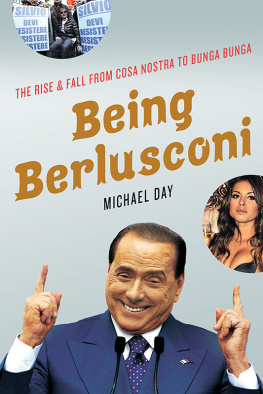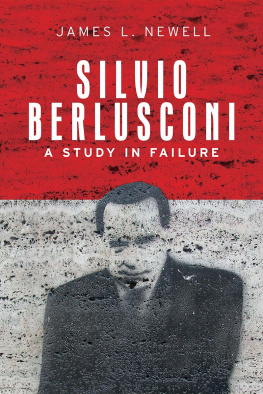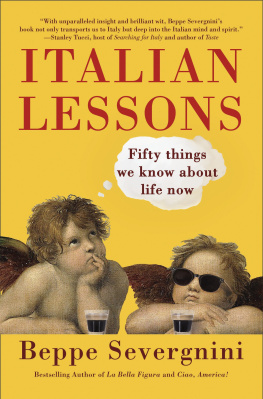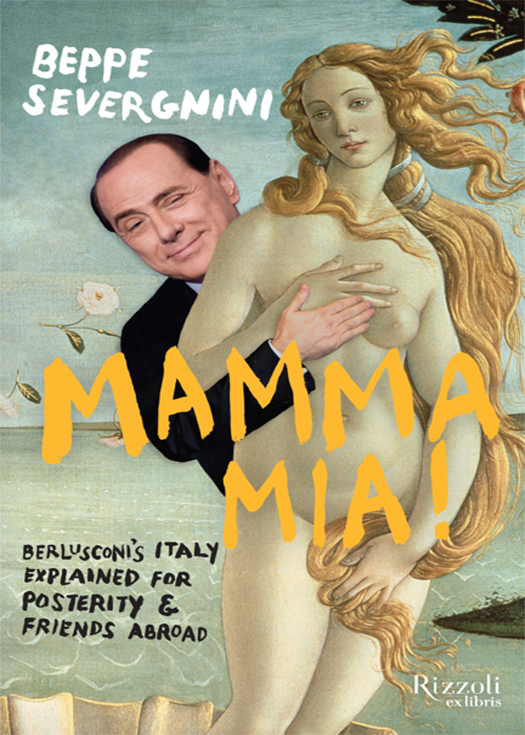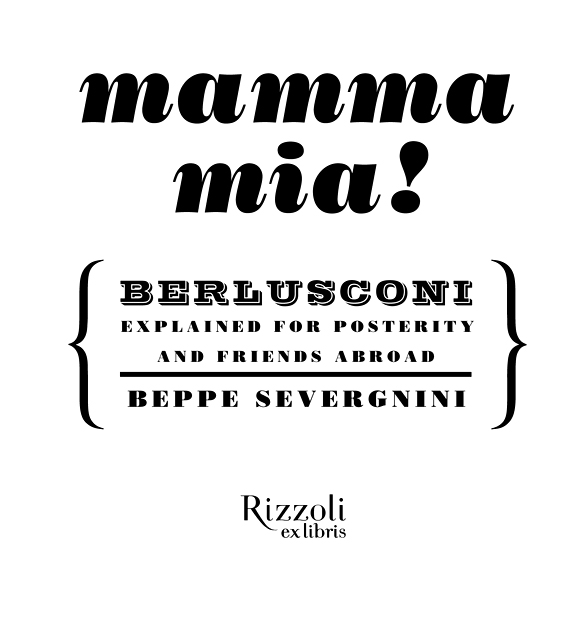
First published in the United States of America in 2011
by Rizzoli Ex Libris, an imprint of
Rizzoli International Publications, Inc.
300 Park Avenue South
New York, NY 10010
www.rizzoliusa.com
2011 Beppe Severgnini
Originally appeared in Italy as
La Pancia Degli Italiani: Berlusconi Spiegato Ai Posteri.
Copyright 2010 by RCS Libri S.p.A. Milano
Translated by Giles Watson
This edition published by arrangement with Georges Borchardt, Inc., New York, and Rosaria Carpinelli Consulenze Editoriali srl., Milano
All rights reserved. No part of this publication may be reproduced, stored in a retrieval system, or transmitted in any form or by any means, electronic, mechanical, photocopying, recording, or otherwise, without prior consent of the publishers.
Distributed in the U.S. trade by Random House, New York
eISBN: 978-0-8478-3744-1
Library of Congress Catalog Control Number: 2011930248
v3.1
To his electors and disrespecters
Im not afraid of Berlusconi in himself,
Im afraid of Berlusconi in me.
GIAN PIERO ALLOISIO
Contents
Initial conclusions
Ten factors (plus one)
Concluding preliminaries
(How this book came about)
{ INITIAL CONCLUSIONS }
Ten Factors (Plus One)
E xplaining Silvio Berlusconi to the Italians is a waste of time. Everyone has a take, honed by years of indulgence or intolerance, and impervious to change. Every Italian has the one true interpretation. Discussion is superfluous.
Profiling Silvio Berlusconi for posterity, and for non-Italians while were at it, will be more helpful. The future isnt here yet, but it will want to know what was going on, and non-Italians just dont get it, but would like to.
How was it that Silvio BerlusconiMr. B. for shortwas voted into power (1994), voted in again (2001), and voted back in (2008)? The hammerings he took in the administrative elections and referendum (2011) hint at change, but the question remains: Why does a majority of Italians support and/or put up with him? Cant they see his appetites, his limits, his methods? Obviously, they can. If Mr. B. has dominated public life for almost two decades, there is a reason. Actually, there are ten (plus one).
1. THE HUMAN FACTOR
What do most Italians think about Silvio Berlusconi? Hes just like us. And the ones who dont are afraid he might be. Mr. B. adores his kids, talks about his mamma, knows his soccer, makes money, loves new homes, hates rules, tells jokes, uses bad language, adores women, parties hard, and is convivial to a fault. He has a good memory and a knack for tactical amnesia. Hes come a long way, switching between lifes freeways and its shortcuts. Hes unconventional, but knows the importance of convention. He extols the Church in the morning and the family in the afternoon, and brings girlfriends home in the evening.
Mr. B. is great entertainment value, so he gets away with plenty. Many Italians ignore his conflicts of interest (havent we all got em?), his legal issues (a defendant is easier to like than a judge), and his international bloopers (hes so spontaneous!). What about the broken promises, the half truths, the blurring of public and private life? Some people get worked up about that sort of thing; others turn a blind eye. Apparently, there are more of the latter than the former.
2. THE DIVINE FACTOR
Mr. B. knows that praising the Church helps most Italians feel less guilty about not going to mass, or systematically ignoring seven of the ten commandments. We dont expect our leaders to walk the walk when they talk the talk. Private indignation at public contradictions shifts votes in many democracies, but not in Italy. Silvio knows that hes dealing with a country that eschews expectations to avoid disappointment.
The Vatican, if not Italys parishes, is content with Catholicism-friendly legislation and doesnt worry about the bad examples. Catholic movements such as Comunione e Liberazione like to focus on ends, which are safely in the future and therefore negotiable, rather than the means their friends employ to reach them. This eschatological take is music to Mr. B.s ears, for it shifts attention from actions to intentions.
3. THE ROBINSON FACTOR
Every Italian feels he or she stands alone against the world, or if not the world, the neighbors. We take pride in surviving, socially and economically. It shows how resourceful we are. Much has been written about Italian individualism, its expedients, its limitations, and its consequences. Mr. B. started out from there, first amassing his fortune and establishing himself as a self-made man, before building on Italys distrust of all things shared, the widespread antipathy for rules, and the inner satisfaction Italians take in finding a private solution to a public problem. In Italy, there is no real cohesive public pressure for a new, fairer tax system. People evade the one they have.
Every Italian feels like Robinson Crusoe, a castaway on a crowded peninsula.
4. THE TRUMAN FACTOR
How many newspapers, apart from sports papers, are sold in Italy every day? Five million. How many Italians regularly use bookstores? Five million. How many Italians browse major news websites? Five million. How many watch the Sky TG24 and TG La7 news? Five million. How many watch current affairs programs on late-evening television? Five million, across the political spectrum.
You get the feeling theyre always the same people, so well call them the Five Million Club. Are they important? Obviously, but they dont decide elections. Televisionall TV, not just newscastsremains pivotal, because it molds images, sends out messages, leaves impressions, tells you some things and, crucially, keeps quiet about others. Guess who owns private television and controls public TV in Italy.
Its like Peter Weirs seminal film, The Truman Show. Someone helped us think.
5. THE HOOVER FACTOR
Hoover, founded in 1908 in New Berlin (now Canton) in Ohio, is synonymous with vacuum cleaners. In English-speaking countries, to use a vacuum cleaner is simply to hoover. The companys door-to-door reps were skillful, legendarily tenacious manipulators of psychology, ruthless in pursuit of a sale.
Mr. B. has a flair for commercial seduction, carried over from his previous careers in construction, television, and advertising, that he now applies to politics. Hes well aware that a message has to be straightforward, appealing, and reassuring. He knows that repeating it works. And he is convinced that in an appearance-obsessed nation, image is key. In Italy, making the right impression wins hands down over doing the right thing.
6. THE ZELIG FACTOR
All politicians need to be able to identify with their interlocutors. Few are capable of actually turning into them. A need for approval has taught Mr. B. the art of transformation. Woody Allens Zelig would be proud. A family man with his five children (and two wives, while they lasted). A womens man among the ladies. Youthful with the young. Wise with the old. A night owl with the night set. A worker at the workplace. Entrepreneurial with the business community. Youthful with the young.


